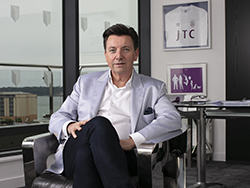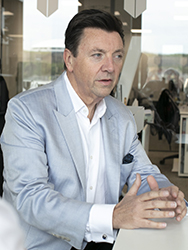 JTC’s shared ownership model has been at the heart of the firm’s 30-year growth story, which has seen it go through owner management, private equity backing and, most recently, a London listing. Now, the approach has earned it case study status on Harvard Business School’s MBA course. CEO Nigel Le Quesne is, quite rightly, feeling rather proud
JTC’s shared ownership model has been at the heart of the firm’s 30-year growth story, which has seen it go through owner management, private equity backing and, most recently, a London listing. Now, the approach has earned it case study status on Harvard Business School’s MBA course. CEO Nigel Le Quesne is, quite rightly, feeling rather proud
What’s your background and how did you get to where you are now?
I’m Jersey born and bred. At the start of my career, I spent a 10-year stint with the civil service here in Jersey. During that time, I qualified as a chartered secretary and joined PwC – that would have been in the late 1980s. And then a couple of years after that, I joined what is now called JTC as its fifth employee. It was there that I began to understand the dynamics and the potential of the trust sector.
It was around that time that I experienced a challenging life event. I lost my first wife in 1996 and I think the grieving process added a little bit of strength to my character. I tried to channel that into something positive by focusing on creating and growing a different type of organisation from what was around at the time – that organisation eventually became what JTC is today.
How did that manifest itself? In the late 1990s, I implemented a model where everybody was an owner of the business – we hear a lot about that today, but it wasn’t as common back in those days. It’s based on the fundamental tenet that if you allow people to share in the benefits of growing a successful business, the business itself will be stronger and the service provided to your clients will be better.
What impact has that ownership model had on the business – and has the model been affected by JTC going public in March 2018?
Everybody who works for JTC remains an owner of the business and, as a listed business, we have an internal key performance indicator of trying to keep that ownership at around 25% of the total share capital.
I think the model creates a bond that is different from a normal employer/employee scenario. Everybody feels that they’re part of something. As a result, we never really see a nine-to-five mentality from our people, the principle being that we all own part of the business and we’re all in it together.
We spend a lot of time making sure the model is meritocratic, so that everybody builds up the value they hold in the business over the period of time they’re with JTC, based on their performance and seniority.
It’s been very successful – so much so that we’ve been recognised by Harvard Business School’s MBA course. They’ve chosen our business as being unique in how we’ve dealt with shared ownership and we’re being featured as a case study in the first semester of the next academic year. I also have the honour of taking part in the first couple of lectures in Boston.
In a nutshell, what does JTC do?
We’re a fund administration business and a trust company. We help individuals, families and institutions to administer, manage, grow and preserve wealth in a responsible and sustainable way. But, probably most important for me, we concentrate on client service excellence with an emphasis on surpassing expectations rather than just doing what’s required.
On the institutional side of the business, we’re now a major global fund administrator with a wide range of clients – from first-time fund managers right up to some of the world’s largest institutions. This is across a range of asset classes, which includes private equity, real estate, infrastructure, renewable energy and, more recently, fintech.
On the corporate side, we provide services to a number of multinationals. Included in that will be some employee benefit-type structures and we’ve used the expertise of running our own employee ownership schemes to help and advise others with that.
And for clients that are individuals and families, we’ve become a sophisticated provider of services to family and private offices, acting for many as the manager of all their individual advisers. Some of those clients have been with us for over 25 years.
Recently, you celebrated your first anniversary of being listed on London Stock Exchange. Why did you decide to go public?
We had a really good relationship with our private equity backers at CBPE, but we’d come to a natural end of their target investment period. More importantly, we were probably growing beyond their capacity to support us, so it was time to look at a new stage in our development.
There had been similar companies from our sector come to the market, both in the Netherlands and here in Jersey, so the understanding of the dynamics in our market had become more sophisticated among the investor community. But most importantly, we were keen to retain our independence and protect our staff ownership. The listing allowed us do that.
 How has that first year of being listed changed the business?
How has that first year of being listed changed the business?
On the whole, it’s been an overwhelmingly positive change for the business and a bit of a coming of age. We’ve grown into being a business worthy of being listed on London Stock Exchange – it’s definitely raised our profile in a positive way.
In terms of our structure and operations, they haven’t changed much because JTC has always grown organically and by acquisition, and we’ve added to our infrastructure as we’ve gone along. So it’s building on 30 years of success.
And, of course, as you go from being a locally owned and managed business through to being private equity backed and so on, there’s a natural scaling up of your firepower as you go.
Having said that, from a personal point of view, I certainly have to spend more time on our being a PLC – probably around three months of the year. You have to get to know a whole new investor base and understand the dynamics of the public markets.
Private equity tends to work on a five- to seven-year cycle and you’re ultimately judged on the price you achieve at the end. In a listed environment, you’re priced by the second and it tends to revolve around the half-year and full-year results, so there’s a lot of focused and intense activity around those times.
The time this takes away from the day-to-day running of the business is a challenge because I like to roll up my sleeves and help with client relationships and driving operational excellence for the business as a whole.
Bearing in mind so much of your time is now taken up with PLC-related duties, how do you manage to stay in touch with what’s happening on the frontline with employees, the business and with clients?
Over my 30-year history with the business, I have ushered in many of those clients over time myself, so I don’t feel too far detached from the business.
Obviously, year-on-year, new clients come in and when we acquire businesses I know those clients less well. However, I think that, because of the experience I’ve had in the industry as a whole, I feel close enough to it.
There’s also very much a ‘JTC way’, which has been honed over these 30 years or so. Whether you join by acquisition or you’re hired in, it’s quite clear from the beginning that this is our approach to business. That helps me to stay in touch with how things are being run.
What is the ‘JTC way’?
From the moment someone arrives, we take them on a journey with us and they develop as they go through it. So, all the time, we’re building our future leaders through what we call the JTC Academy.
Our JTC Gateway initiative gives people the opportunity to develop their careers in different parts of the world or other parts of the business. And we’ve recently introduced JTC Wellbeing, which helps our people take a holistic approach to their physical and mental health.
Shared ownership is at the heart of the JTC way. When people join us, they can expect to become an owner of the business, be treated fairly at all times, have equal opportunities in every respect and operate in a meritocratic environment.
In return, there’s an expectation that they put the company before them individually, for the most part. That drives entrepreneurial behaviours around getting things done – winning and over-servicing, rather than under-delivering.
It also encourages people to maximise their individual potential. If we can’t help them to do that, then we’re failing them in some way. This whole approach drives us to get bigger and better every year, and retain the best people on the journey.
After your first year as a listed company, you reported 30% growth in revenue. Is that linked to the listing or were you on track to do that anyway?
Taken in isolation, it does look like a particularly good year, but several things actually came to fruition at the same time.
We’ve got a two-pronged approach to growth. We look to grow organically on a net basis of between 8% and 10% a year. Also, since 2010, we’ve become an accomplished acquirer of businesses. We’ve learnt to work out what ‘good’ looks like in terms of an acquisition, especially value for money and cultural fit.
It’s important to remember that whenever we make an acquisition, we’re inviting these people in as partners and keepers of our culture.
So those are the two levers we pull on each year and we expect both to improve our performance – which clearly they did in our first year as a listed business.
What will your growth strategy be going into the future?
We’ll continue to keep it simple. We expect net organic growth from our existing book of 8%-10% a year and everyone’s targets are built out that way. And then we will look for one or two acquisitions a year.
As I’m sure you know, it’s a rapidly consolidating market and to a large degree I suspect that over the next decade or so we’ll end up with perhaps only five to 10 global players. My expectation is that JTC will not necessarily be the biggest, but we will be the best of those from a service and performance point of view.
So, it’s about finding the right acquisitions and opportunities in the right geographies, and paying fair prices for them.
Our operational departments – finance, IT, business development and marketing, legal, HR and facilities – all play an important role in making sure we integrate businesses as quickly as we possibly can.
 What’s your approach to successful integration – because that’s often where M&As run into trouble?
What’s your approach to successful integration – because that’s often where M&As run into trouble?
We’re very quick to try to make offices we acquire look and feel like all of our JTC offices. At the very least, we’ll use the JTC brand alongside a local brand. Obviously, all of the staff become owners immediately.
There’s always the potential for some tension, but I think it’s as well organised as it can be, given that we’re doing two or three deals a year and some of those deals will be multi-jurisdictional.
It becomes slightly more problematic when you’re layering a management team over or alongside an existing management team – it takes a certain amount of skill to make sure that you get cohesion as quickly as you can.
It’s slightly easier when you’re acquiring in a new territory, of course, because, generally speaking, that management team ends up running that jurisdiction.
How has your brand evolved as you’ve moved from a local to a global company through acquisition?
JTC was originally Jersey Trust Company, but as we became a global business, we didn’t necessarily want to be associated with just one jurisdiction. Calling ourselves a trust company was limiting as well, because we’re typically around 70% institutional business, a big chunk of which is fund administration services. So we evolved into JTC around 10 years ago – though we’re very proud of where we’ve come from.
Do you see the brand evolving further as you continue to grow?
I think the brand awareness is at a point now where, even if we wanted to change it, it would be difficult because, in our market, people instantly recognise the JTC brand along with some of the other global brands that are out there.
Looking ahead, what challenges is JTC facing? Will Brexit have any impact on you as a London-listed company?
It’s definitely a complicated topic and it’s been running for far too long. In my view, the inability to make a decision on how to go about it has been quite negative, not specifically for our business but for the UK as a whole.
Personally, I thought holding the referendum was a poor and ill-informed decision – never ask a question unless you’re ready for the wrong answer.
However, bringing it back to JTC, we’re in 18 jurisdictions, some of which will benefit from Brexit – Luxembourg and the Netherlands, for example. It will make the world more complicated and more difficult to do business in, but in that difficulty often comes opportunity for a business like JTC. So I don’t think we’ll be particularly adversely affected by it.
As for London, I think that London is a world city which just happens to be in the UK. It’s a global financial centre that clearly leads the European financial centres so, in all honesty, I don’t believe London’s role will diminish significantly.
And what about for the trust sector as a whole? Will consolidation continue to be the main story going forward?
I’m not a believer in getting bigger for bigger’s sake but, clearly, it’s harder for a single-jurisdiction player to stay in the business. Even if you have a small international presence, the size of the competitor landscape can be a bit overwhelming – particularly if you have to become an expert in a much wider field than just your local one. I think the trick is to make bigger better as opposed to just becoming bigger.
I don’t doubt that in 10 years’ time there may be a move back towards more local boutique-type regional firms, or ones that focus on a specific jurisdiction or skill set. But I still see this consolidation trend for the foreseeable future, possibly driven by more listings coming down the track and private equity interest.
FACT FILE
Name: Nigel Le Quesne
Age: 58
Position: CEO, JTC
Home town: Jersey
First job: Deck chair attendant on St Brelade’s beach
Family: Married to Annie, with two daughters, Loren and Lara
Hobbies: All sports, but particularly Tottenham Hotspur
Did you know: Nigel co-produced the 2010 England World Cup song Shout for England